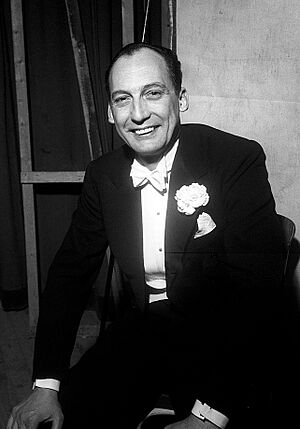Alberto Semprini facts for kids
Quick facts for kids
Alberto Semprini
|
|
|---|---|

Alberto Semprini in 1954
|
|
| Background information | |
| Birth name | Alberto Fernando Riccardo Semprini |
| Born | 27 March 1908 Bath, Somerset, England |
| Died | 19 January 1990 (aged 81) Brixham, Devon, England |
| Genres | Classical |
| Occupation(s) | Musician, composer, conductor |
| Instruments | Piano |
Alberto Fernando Riccardo Semprini (1908–1990) was a talented English musician. He was a pianist, composer, and conductor. Many people knew him as Alberto Semprini or just Semprini. He became famous for his shows on the BBC, especially on the radio. He was also honored with the Order of St John and the Order of the British Empire for his good work.
Contents
Early Life and Education
Alberto Semprini was born in Bath, England. This was on March 27, 1908. His family had Italian roots. From a young age, Alberto showed a great talent for music. He could play both the piano and the cello very well.
His father, Arturo Riccardo Fernando Semprini, was a musician from Italy. His mother, Elizabeth Tilley, was an opera singer from England. Alberto was the second of their three sons. He went to the Verdi Conservatory in Milan, Italy. He graduated from there in 1929. At the conservatory, he studied how to compose music and how to conduct an orchestra. He also became even better at playing the piano.
Music Career
Alberto Semprini started his music career in Italy. He played many different types of music. This included pop, jazz, and classical styles. In 1938, he led his first radio orchestra in Italy. He also performed often at the Sanremo Music Festival in the late 1950s. This is a very famous music event in Italy.
During the Second World War, life became difficult for him. Even though he had a British passport, he was asked to join the Italian military. He was not accepted because he was not fit enough. However, his passport was taken away. People thought he was on Britain's side, which was true.
He moved to Sanremo to write music. In 1944, he went back to Rome. He waited for the Allied Army to arrive. When they came, he helped them with entertainment for soldiers. There, he met an actor named Michael Brennan. Brennan helped Alberto get his British passport back.
In 1949, Michael Brennan brought Alberto Semprini to London. In 1950, he signed with His Master's Voice record company. He made many recordings for them until 1963.
Semprini Serenade
Back in the UK, Alberto Semprini started a popular radio show. It was called Semprini Serenade. He would begin each show with a special phrase. He said: "Old ones, new ones, loved ones, neglected ones." The show first aired on BBC Radio in 1957. It continued for about 25 years.
On his radio show, he played with the BBC's own orchestras. For his records, he often played with the New Abbey Light Symphony Orchestra.
Compositions
Alberto Semprini also wrote his own light music. Some of his famous pieces include Concerto Appassionato and Mediterranean Concerto. He even used Mediterranean Concerto as the theme song for his radio show.
In 1977, Alberto Semprini stopped performing on stage. He had a performance in York. After that, he decided to leave the stage. He said he had lost some of his confidence.
Personal Life
Alberto Semprini lived on a houseboat in West Mersea, Essex. He also lived in Brixham, Devon. He passed away in Brixham on January 19, 1990. He was 81 years old.
Recordings
Semprini recorded a lot of music. His first recordings were on an Italian label called Fonit Cetra. Later, he recorded for EMI Records. He stayed with EMI for the rest of his career.
He was well-known for light music. However, most of his recordings were of famous classical pieces. These included the Grieg Piano Concerto. He also recorded solo pieces by great composers. These composers included Beethoven, Chopin, Liszt, Tchaikovsky, and Debussy.
In 2015, Vocalion Records released a CD. It had recordings from his BBC radio shows in the late 1950s. Most of these had not been heard since they were first broadcast.
Honours
Alberto Semprini received special honors for his work. In 1973, he was made an Officer of the Order of St John. This order is known for its charity work. On November 30, 1983, he received another honor. He was appointed an Officer of the Order of the British Empire. This was to recognize his many contributions to charity.
 | DeHart Hubbard |
 | Wilma Rudolph |
 | Jesse Owens |
 | Jackie Joyner-Kersee |
 | Major Taylor |

